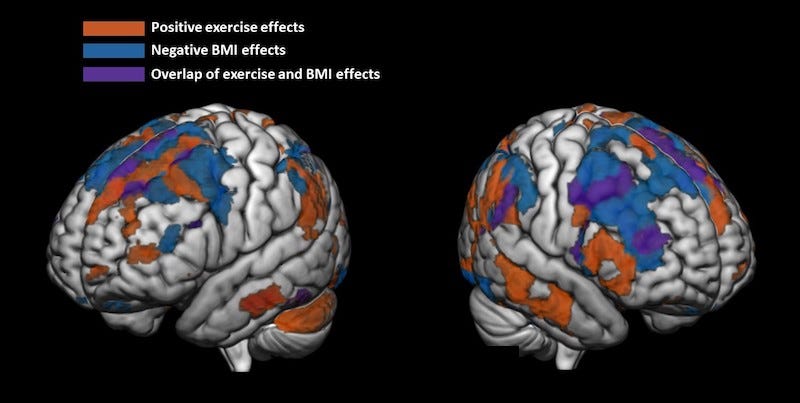Quick Hits
Daily brief research updates from the cognitive sciences

Ok, we all know by now that exercise is good for you. Many of you may also be more than aware that exercise is a potent stimulator for the brain encouraging brain growth and effective functioning. Read my article on brain health here.
Two pieces of research have recently been published which show, however, that not just exercise is good for you, but the timing is essential. Specifically, that exercise in pre-teens predicted the fitness of their brains later and also, by another piece of research, that exercise in childhood predicted healthy adult brains!
So, first off, the study from Boston Children’s Hospital shows that physical activity helps to organise developing brains. This study analysed brain imaging data from almost 6’000 9- to 10-year-olds and found that physical activity was associated with brains that were:
- More efficiently organised
- More robust
- Had more flexible networks
Basically giving kids fitter brains all round and better able to adapt to whatever challenges and cognitive functions come at them. Of note is that it didn’t matter what kind of activity — any physical activity is good.

This then leads us to separate recent study, nicely linking to the above, which looked at childhood pre-teen exercise and cognitive function in later life mapped to MRI data (214 participants aged between 26 and 69). This was conducted by a research group with Professor MATSUDA Tetsuya of Tamagawa University’s Brain Science Institute and Assistant Professor ISHIHARA Toru from Kobe University’s Graduate School of Human Development and Environment.
The results showed that
- People who are physically active during childhood (up to 12 years of age) have higher cognitive functions in later life.
- The positive association between childhood exercise and cognitive function could be seen in the modular segregation of brain networks, strengthened inter-hemispheric connectivity, greater cortical thickness, lower levels of dendritic arborisation and decreased density.
During early childhood the brain is at its most plastic and it seems that exercise optimises the networks and structures that are later used for multiple cognitive functions.
That’s good news, or maybe bad news. Bad news because they couldn’t find an association with cognitive functions and post-childhood physical activity. This is a surprise because there is a lot of research on the positive benefits of exercise — but it could be that these changes are only mild compared to the impacts on a developing child brain which set it up for life.
Got kids? Well, get them exercising!

Andy Habermacher
Andy is author of leading brains Review, Neuroleadership, and multiple other books. He has been intensively involved in writing and research into neuroleadership and is considered one of Europe’s leading experts. He is also a well-known public speaker speaking on the brain and human behaviour.
Andy is also a masters athlete (middle distance running) and competes regularly at international competitions (and holds a few national records in his age category).
Reference
More Quick Hits
Unique Social Genes in Human Beings
Quick HitsDaily brief research updates from the cognitive sciences ne differentiating factor with human beings is our pro-sociality. This means we are a social species, and this sociality is seen in our ability to empathise, be socially tolerant,...
Want to Live Longer? Be Optimistic!
Quick HitsDaily brief research updates from the cognitive sciences e probably all know some people who are particularly pessimistic - always putting a negative side to things and expecting the worst outcomes. We probably also know some people who...
How Having Had COVID-19 Negatively Impacts Performance at Work
Quick HitsDaily brief research updates from the cognitive sciences ’m sure we’re all aware of the various negative aspects of having contracted COVID-19 such as long COVID but also the brain fog that seems to have been a feature that many people...
Narcissistic Leaders Block Knowledge Flow and Cooperation
Quick HitsDaily brief research updates from the cognitive sciences arcissism is considered one of the three dark-triad traits and something that has been reported as being common in senior leaders. The important question is can and does this hinder...
The Science of Exposing Liars
Quick HitsDaily brief research updates from the cognitive sciences he one place that we can consistently catch people lying is in job interviews. And the question has long been how do you catch out these liars? The answer is you need to outsmart...
High Traffic Noise at School, Slower Cognitive Development
Quick HitsDaily brief research updates from the cognitive sciences ho would have thought that traffic noise could impact cognitive development of kids? Well according to this recent piece of research it can. Are you sure? Well, these researchers...






